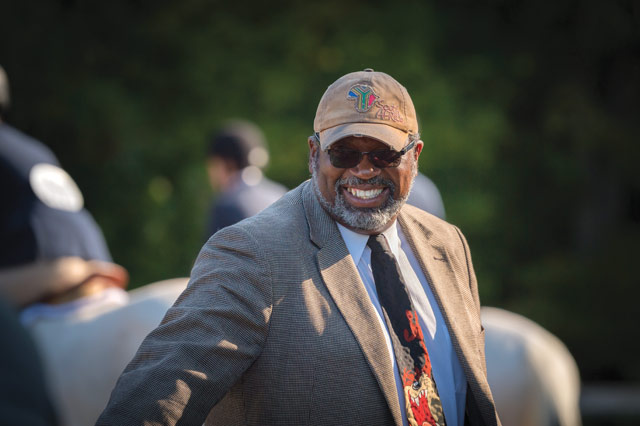By Jessica Hein
Drawing from the ups and downs of his own life story, Kennis “Buttons” Fairfax is on a mission to promote positivity in the horse world.
Entering the show pen can be intimidating—months of hard work and last-minute preparations culminate in one final performance, and all eyes train on the lone horse-and-rider team. As you run your hand down your partner’s muscular neck, brushing imaginary dust off his silky, shimmering coat in an absentminded gesture that’s more about soothing your own nerves than those of your partner, you review the game plan in your mind one last time.
The judge awaits you in the middle of the pen, a towering oak in the middle of a sandy desert, eyes shaded by the brim of his perfectly shaped cowboy hat. Swallowing your anxieties, you make eye contact and nervously commence the pattern. Up close, the 6-foot-2 judge is even more formidable than you first thought, at least until his lips part in a wide grin—pearly whites gleaming against his ebony skin, eyes sparkling. A linebacker-meets-John-Wayne, the judge’s velvety baritone cracks a joke as he circles your horse, an unexpected gesture that releases the tension from your shoulders and reminds you to breathe as you smile and show off your horse.
Kennis “Buttons” Fairfax of Westfield, New Jersey, isn’t your typical horse show judge, both in his ex-football player build and in his uncanny ability to set even the most nervous exhibitors at ease in a way that makes the experience a fun, learning-focused opportunity. It’s that quality—paired with a dedication to fairness, honesty and integrity, along with a passion for teaching—that keeps the judge in high demand, booked a full 24 months in advance in most cases.
“I call it financial planning,” he said. “I hope these people will be showing horses for a long time—and that their children will be showing and their grandchildren will be showing—so I will be 200 years old and still getting calls to judge shows. Judging is a privilege, and I don’t take it for granted.”
Although Buttons—a college-era nickname derived from the button-dotted military shell cap he favored at the beginning of his judging career—is well-loved as a judge on the local, national and international stage. His road hasn’t always been easy, especially as a black man establishing a foothold in the Western horse show world. Though he faced discrimination at times, Buttons remained undaunted, arming himself with a hearty laugh, a sunny attitude and a broad grin in pursuit of his dreams.
A Horseman at Heart
Buttons came by his love of horses honestly, gazing at equines of all shapes and sizes as he traversed the country around age 5, clutching his grandmother’s apron strings en route to visit relatives in Oklahoma, Georgia and New Jersey.
“My grandmother was a great individual who would help you whenever she could,” he said. “She helped my mother care for my sisters and me, and I just stayed with her permanently after my father’s death. When my grandmother came to live with my uncle in New Jersey, I came with her.
“As far back as I can remember, I have always had an interest in horses. My family had four mules that we used on the farm to plow fields, feed stock and pull the wagon; I always wanted to be around them. My grandmother used to tell stories of me as a young child following the mules and swinging from their tails—she wondered why I didn’t get kicked,” Buttons said. “Sometimes I wonder if they didn’t kick me when no one was watching and that’s why I am the way I am today!”
Buttons hung around barns and feedlots, bumming a ride on anything he could throw a leg over. High school graduation gave way to Delaware State College, where the ambitious Buttons majored in pre-veterinary medicine and visual communications and minored in African-American studies and guidance/counseling. His academic pursuits were briefly interrupted when he tried out for the Seattle Seahawks in 1978, but he returned to college after breaking both legs and graduated in 1982.
This is an excerpt from the full article—get the whole story in the Winter 2017 Chrome magazine, which is sent to all current APHA members. Not a member? Join or renew at apha.com/join.
##





